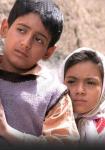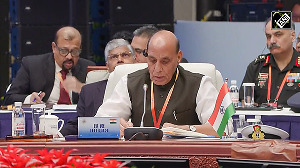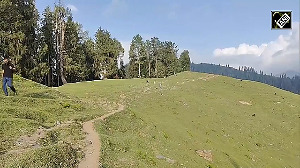
Iran President Mohammed Khatami's gracious presence at the Republic Day parade in New Delhi is itself a message. India only invites its close friends as chief guest at the parade. Iran is one of India's closest friends and this visit shows the value we attach to our relations with Iran.
Iran has responded very well in spite of the propaganda on matters like Gujarat. Particularly when Pakistan is trying to play it up. Since the Iranian president is aware of India's ancient civilization and its values, he considers India a secular country.
Mohammed Khatami is the author of many books. He is an intellectual who started his career as an academician. The people of Iran respect his liberalism and have elected him twice with an overwhelming majority.
During one-on-one meetings, President Khatami is a very lively person. He has deep knowledge of India's culture, philosophy and history.
We discussed Hindu mythology and Hinduism.
His brother, who is chief of the cabinet, accompanied him. The president stayed in Rashtrapati Bhavan's Dwarika suite and enjoyed Indian food. He said he liked Indian spices. Before leaving for Iran, he shook hands with all those who served him in Rashtrapati Bhavan.
Ten years ago he visited India as Iran's cultural minister and toured the country.
The president has a thorough knowledge of India's freedom struggle and has great regard for Mahatma Gandhi. In a lecture to students in New Delhi he said Gandhi did not belong to India alone, but to all of mankind.
On January 4, I was in Iran for a meeting on economic and diplomatic co-operation. I had gone for an interesting project called Chabahar between India and Iran. Chabahar is a port in Iran. This project will eventually give us access to Afghanistan. It will modernise the port and the roads leading from there to Afghanistan and to Central Asia. Later, it will be extended to Russia.
We are building a 250-kilometer road at a cost of $60 million from the Iranian port to Afghanistan and further to the north. It will be constructed within three years. India's Border Roads Organisation has given us an assurance that it will complete this project before time.
If this project comes through we can go to Central Asia without entering Pakistan. Today, it is difficult to go to Afghanistan if one does not go via Pakistan. Recently when we gave a million tonnes of wheat to Afghanistan under its reconstruction drive, Pakistan objected to the use of its territory.
The India-Iran pipeline project is not shelved but we are cautious about it. The pipeline has to pass through Pakistan and we have our national security apprehensions. For India, it's not merely a political decision, it's an economic decision too.
After all, the situation in Pakistan is not good. If something happens tomorrow, who will take the responsibility of the Iran-Pakistan-India gas pipeline? Once we become dependent on Iranian gas, who will take responsibility if the supply is disturbed?
We import lots of oil from Iran which constitutes more than half of Indo-Iranian trade. Now if we buy more gas and LPG we can barter other things like edible items and technology. We need not pay cash for gas.
This January, India and Iran have achieved everything they wanted because of President Khatami's visit. Our general agreements, our road map towards further strengthening of relations, our strategic alliance and our trading of gas -- we have agreed on all such aspects, including Information Technology cooperation.
As far as the possibility of war against Iraq is concerned, India and Iran share the same perception. No one country should have a unilateral right to attack Iraq. Whatever action needs to be taken should be taken at the United Nations.
India and Iran also believe the leadership of any country is an issue that should be decided by its own people. Outsiders can't decide any country's leadership issue.
Iraq haunted us during my four days of encounter with the president. He was very categorical about his stand on Iraq. He said how they had fought wars with Iraq but these are different times. He also spoke about India's ethos and values. How India and Iran are ancient civilizations and the depth of our relations.
He also shared few historical facts with me. He spoke about the elegant gown he always wore. The culture of wearing the gown had spread from Iran to all over the world. Christianity, many other civilisations and modern universities have adopted gowns from Iran. In ancient times only Islamic scholars wore these gowns.
He also talked about how Iranians migrated to Kashmir centuries ago. He said the Chinar tree had come to Kashmir from Iran. "Now, your Chinar is bigger than our Chinar," he said in lighter vein.
The minister of state for external affairs, minister-in-waiting during President Khatami's visit, spoke to Senior Editor Sheela Bhatt.





